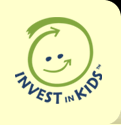Intellectual Development means being able to communicate, to think both creatively and abstractly, to pay attention, solve problems, and develop keen judgment and a lifelong readiness to learn. | Emerging Skills Sort groups of objects into setsBecome aware of the names of numbersBecome aware of the verbal sequence of numbersBegin to understand the meaning behind numbersBegin to develop an understanding of one-to-one correspondence (one plate for one person or one toothbrush for one slot in a holder)Begin to understand ordinal numbersBegin to understand the concept of time – "soon," "in a long time" and so onFind out more about What to Expect from your toddler, 2 to 3 years. |
|
Parents Can: Sing number songs and rhymes | Child Will: Become aware of number names and sequences in songs and rhymesBegin to remember number sequences and develop confidence in using numbers (even if the way in which the numbers are used is incorrect)Begin to practice numbers and number sequences during play
| |
Parents Can: Incorporate numbers and counting into daily routines, such as tidying up toys or putting away tin cans | Child Will: Begin to understand numbers are a part of her everyday environmentBegin to experiment with the way numbers are used to gain a better understanding of themBegin to understand the concept of one-to-one correspondence, although it will not be mastered beyond one to three objects at this stage
|
| | |
Parents Can: Incorporate counting into child-initiated activities, such as block building. For example, "Let's count how many blocks you used in your tower" | Child Will: Begin to recognize and correctly repeat number sequences up to fourBegin to understand the meaning of one, although guidance is still needed at this stage
| |
Parents Can: Introduce the concept of ordinal numbers in simple games. For example, "Who is first, who is second" | Child Will: Begin to experiment with ordinal numbers using phrases such as "me first"Experiment with ordinal numbers, often using them incorrectly, but wanting to use the words and hear the soundsBegin to recognize that numbers are used in different ways
| |
Parents Can: Initiate counting games such as "hide-and-seek" or "what time is it Mr. Wolf?" which offer them the opportunity to model counting, and their toddler the chance to hear number sequences | Child Will: Begin to repeat number sequences correctlyTry to count in other games with his friends
|
| | |
Parents Can: Introduce the concept of time when following routines. For example, begin to talk about what happens in the morning, the afternoon, the evening and so on | Child Will: Begin to understand that events follow a sequenceBegin to understand that a clock is what adults use to tell timeBegin to experiment with the use of time in her play, usually in imaginary play situations. For example, "I am the daddy and I will be home after daycare"
| |
Parents Can: Introduce simple number puzzles | Child Will: Begin to associate the spoken number two with the written number "2"Begin to understand that numbers and events follow a sequence
| |
Parents Can: Offer experiences for their toddler to sort objects. For example, all the puzzles in this box, all the crayons in this tin | Child Will: Begin to understand the concept of sortingExperiment with sorting in other areas, such as with blocks (for example, putting all the big blocks in one pile and little ones in another)
|
| |
|
